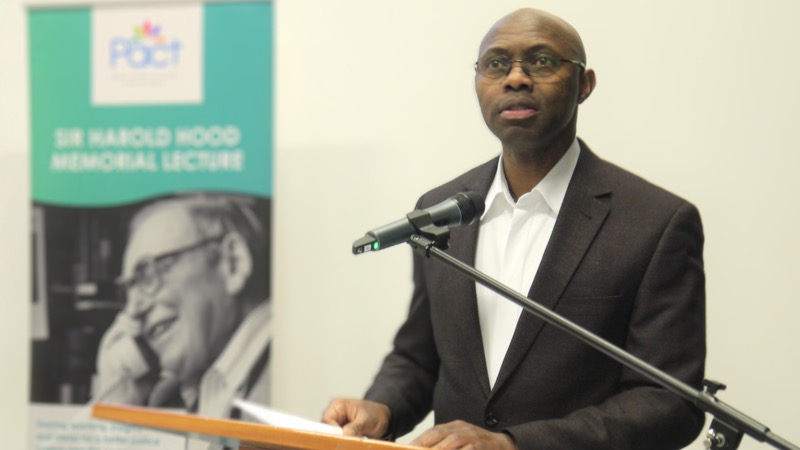Driven by the gospel message and mission of Jesus Christ, the Church remains a “formidable force” in prison reform, the audience at the annual lecture of Pact, the Catholic charity that supports prisoners and their families across England and Wales, was told.
Dr Chijioke Nwalozie, senior lecturer in criminology and criminal justice at De Montfort University, Leicester, said that when prisoners are poorly treated, the Church must act as a critical stakeholder and vanguard of prison reform.
Delivering the Sir Harold Hood lecture at Maria Fidelis Catholic School, Camden, London, Dr Nwalozie, founding director of Prisons Support Services Nigeria, added, “There are many saints in prison. Ask anyone working in chaplaincy and they will tell you.”
Change the World was among the songs sung by Soul Sanctuary at the Sir Harold Hood memorial lecture.
He noted that about one-fifth of those in prison in the UK are awaiting trial or sentence. In India, more than two-thirds of those in custody are pretrial detainees and likewise in Nigeria with 70 per cent of inmates awaiting trial, the greatest number in Africa
“Many officers try their best to work with prisoners who serve their time. However, many of the positive experiences’ prisoners give relate to the chaplaincy and chaplain who may have helped them navigate difficult times and moments like bereavement, divorce, serious ill-health of a family member, or attempted suicide,” he said.
He cited the Norwegian model as one to aspire to, where the recidivism rate is 20 per cent, thought to be the lowest worldwide. “The prison staff are well trained in the liberal arts and social sciences. They behave like social workers to the prison inmates and work very closely with them. They consistently suggest that merely locking up people in prison to deny their freedom is enough punishment. Therefore, the entire staff treat every prisoner with humanity and respect in the hope that the Norwegian society needs them back to help in nation-building, and rightly so – it has been working for them. The Norwegian prison system had Christian beginnings and ethos where the chaplains treated offending from the point of view of sin and forgiveness.”
He noted that for England and Wales, a Ministry of Justice prison population projection signals an accelerated rise to 94,400 by March 2025 and another projection of 93,100 to 106,300 by March 2027. “It is suggested that employing an additional 23,400 police officers will eventually bring about more arrests and charges, thus leading to more imprisonments. Another significant determinant of this projection is the sentencing policy change of keeping the most serious criminals incapacitated for a protracted period in prison.”
He added: “The Church's prominent presence in prison and involvement in its reform is to help bring the gospel message of Christ – love, mercy, compassion, liberation and forgiveness – to those locked behind bars. They are also children of Abraham and should be saved too. Christ came to seek out the lost so that he may save them.”
Chaplaincy remains an indispensable part of the prison establishment and an essential partway of prison reform and prisoner rehabilitation, he said, but added that without a doubt, the Church can do more. For example, the Church can positively influence penal policies by encouraging more lay members to volunteer as Independent Monitoring Board members “because their reports and recommendations cannot be swept under the carpet”. Also, the Church should lobby to have representations of people with human hearts and faces on the parole board when deciding the fate of a prisoner for early release or on licence. “Finally, the Church must relentlessly speak out whenever the prisoner's plight is reduced to inhuman conditions,” he added.
Pact chief executive Andy Keen-Downs, introducing Dr Nwalozie, said, “We incarcerate more people than any other country in Europe. Far too many people in our prison system are there as a result of mental illness. And every year, for far too many people, prison is a death sentence, as a consequence of suicide or violence.”



 Loading ...
Loading ...